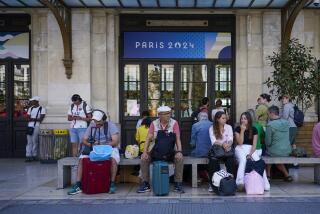Enlarged French Strike Causes Chaos : Europe: Transportation networks come to a near halt. The third major protest in a month against plans to change social benefits tests the government’s resolve.
- Share via
PARIS — Just six months into his presidency, French leader Jacques Chirac was hit Tuesday by a crippling, expanded strike that virtually shut down the nation’s rail and bus network and set up an important test of the new government.
Striking workers in the state-run railway company, SNCF, marking their fifth day off the job, were joined Tuesday by other public transportation employees protesting government plans to reform France’s generous, debt-ridden social security system.
The third major strike in little more than a month created chaos across the country. Nearly every form of public ground transportation, from long-haul and commuter trains to subways and city buses, was affected.
Traffic backed up as much as 20 miles on highways feeding into Paris and other major French cities, and some fights broke out among commuters waiting for the few subway trains still operating in Paris. Several high-speed trains operating in the countryside also were blocked by strikers.
The current wave of strikes, the longest and most disruptive since conservatives won control of Parliament in 1993, has created a major challenge to Chirac and his prime minister, Alain Juppe, the architect of the austerity plan. The two met Tuesday to discuss the ramifications of the labor stoppage, which unions vowed to continue today.
At issue is Juppe’s plan to overhaul France’s cherished welfare state, including proposals that would force the 5 million state workers to pay into the social security system longer before retiring with full benefits. In addition, the plan calls for taxes on some state benefits, including monthly payments the French government makes to families with children.
Juppe’s goal is to cut the French government deficit of $64 billion, and meet one of the important criteria for joining other European countries in a single currency beginning in 1999. Government and business leaders say the country must be part of the single European currency if it hopes to have an economically healthy future.
The reform package, which also includes plans to streamline state companies and privatize others, has been welcomed by business leaders in France. Although many French citizens fear cuts in their government benefits, the majority agree that the country needs to reduce its deficit and make state-run businesses more efficient.
But the bloated public sector, which is the only heavily unionized part of the French economy, has reacted with anger. In particular, the 186,000 workers at the state-run railway company are concerned that the government plans to reduce the SNCF’s $35-billion debt by cutting unprofitable lines and laying off employees.
The government tried this week to appease SNCF workers, who began their strike Friday, by offering to exempt them from some of the provisions of the social security reform package. And Transport Minister Bernard Pons told the National Assembly on Tuesday that his five-year plan to restore the state rail network would provide job security and preserve rail lines. But he said changes in the railway workers’ retirement plan, a central issue in the strike, still are possible.
Government spokesman Alain Lamassoure said Tuesday that “there is no turning back on reform.” He told France-Inter radio that “social security reform is a package. If any one of its elements were thrown into question . . . the entire package would collapse.”
But both Chirac and Juppe are in a difficult situation. Their poll ratings have plummeted. A Gallup Poll conducted last week and released Tuesday indicated that more than 60% of the French disapprove of the job that Chirac and Juppe are doing.
When asked about opposition to his reform plan, Juppe said recently that if 2 million people took to the streets to protest, his government would fall. Union leaders have taken that as a challenge. On Tuesday, about 35,000 people staged a protest march on the Left Bank of Paris, and thousands of others joined similar protests across the country. On Friday, more than 500,000 had joined nationwide protests.
For those who oppose Juppe’s plan, street protest is the only avenue of opposition. Chirac and Juppe’s party controls 80% of the National Assembly, and the only way to stop their plan is to persuade them, through strikes and demonstrations, to modify it.
More to Read
Sign up for Essential California
The most important California stories and recommendations in your inbox every morning.
You may occasionally receive promotional content from the Los Angeles Times.














